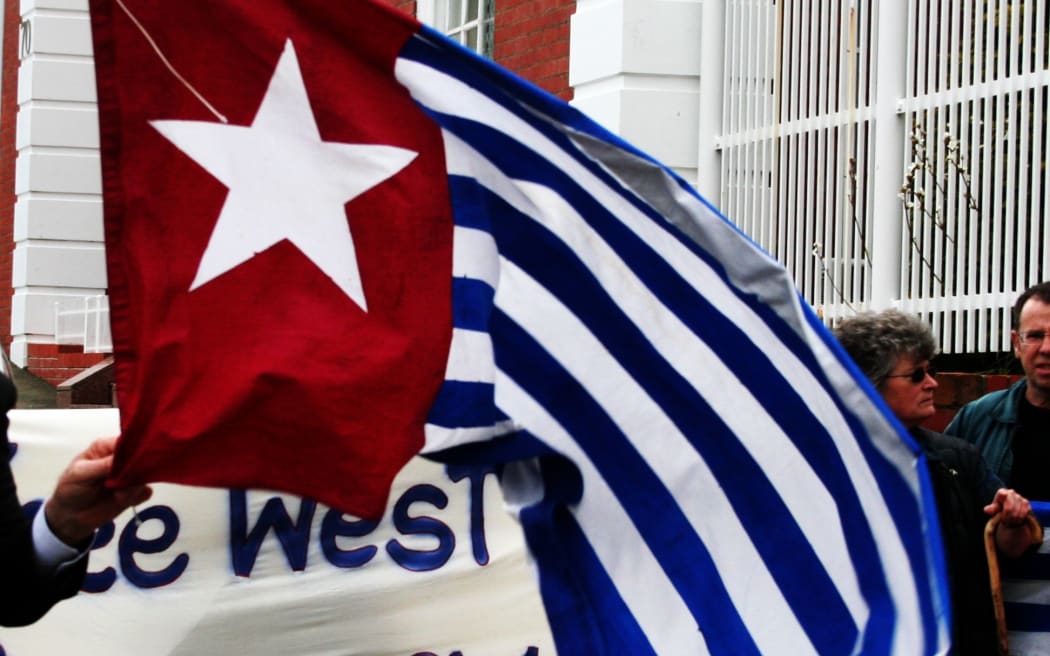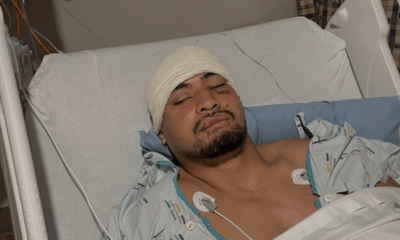World
Indonesian Authorities Transfer Political Prisoners, Sparking Protests

The transfer of four political prisoners by Indonesian authorities has raised significant human rights concerns, according to West Papuan activist Ronny Kareni. The men were arrested in April 2023 on charges of treason after they requested peace talks in Sorong, located in Southwest Papua. Following their arrest, they were moved to Makassar, a city in Eastern Indonesia, where they are currently awaiting trial.
Protests erupted last week outside the Sorong City Municipal Police Headquarters in opposition to the prisoners’ transfer. While demonstrators initially aimed for a peaceful gathering, tensions escalated, leading to violent clashes. Reports indicate that police employed “heavy-handed” tactics to disperse the crowd, resulting in damage to government property and the ignition of tyres. During the unrest, a 28-year-old man sustained serious injuries from a police gunshot to the abdomen. Authorities arrested seventeen individuals for property damage, and a search is ongoing for Sayan Mandabayan, a former political prisoner alleged to be the protest’s organizer.
Kareni expressed deep concern regarding the transfer’s implications for human rights. He stated that the relocation of the prisoners, far from their home city, violates the principles outlined in Article 85 of the Indonesian Procedure Code, which mandates that trials be conducted in the jurisdiction where the alleged offense occurred. He emphasized that such transfers alienate prisoners from their families, community support, and legal counsel.
Indonesian officials have justified the transfer by citing security concerns related to the trial. Kareni insists that the movement for West Papua’s liberation, even through peaceful dialogue, continues to be perceived as treason. He noted, “There is no space for exercising your right to determine your future or determine what you feel that matters to you.” The act of merely initiating peace talks is viewed as a serious offense under the current political climate.
The situation in West Papua reflects ongoing tensions between the region’s push for autonomy and the Indonesian government’s stance on dissent. As protests continue, the human rights implications of such actions are likely to remain a focal point for activists and international observers alike.
-

 World4 months ago
World4 months agoTest Your Knowledge: Take the Herald’s Afternoon Quiz Today
-

 Sports5 months ago
Sports5 months agoPM Faces Backlash from Fans During Netball Trophy Ceremony
-

 Lifestyle5 months ago
Lifestyle5 months agoDunedin Designers Win Top Award at Hokonui Fashion Event
-

 Entertainment5 months ago
Entertainment5 months agoExperience the Excitement of ‘Chief of War’ in Oʻahu
-

 Sports5 months ago
Sports5 months agoLiam Lawson Launches New Era for Racing Bulls with Strong Start
-

 Top Stories2 weeks ago
Top Stories2 weeks agoTongan Star Eli Katoa Shares Recovery Update After Surgery
-

 World5 months ago
World5 months agoCoalition Forms to Preserve Māori Wards in Hawke’s Bay
-

 Health5 months ago
Health5 months agoWalking Faster Offers Major Health Benefits for Older Adults
-

 Lifestyle5 months ago
Lifestyle5 months agoDisney Fan Reveals Dress Code Tips for Park Visitors
-

 Politics5 months ago
Politics5 months agoScots Rally with Humor and Music to Protest Trump’s Visit
-

 Top Stories5 months ago
Top Stories5 months agoUK and India Finalize Trade Deal to Boost Economic Ties
-

 Health2 months ago
Health2 months agoRadio Host Jay-Jay Feeney’s Partner Secures Visa to Stay in NZ









